

Untitled. Untitled. Untitled. Motamediv. Mastery Learning: An Effective Teaching Strategy Vahid Motamedi Assistant Professor Department of Educational Technology Faculty of Psychology & Education Tarbiat Moallem University Mofateh Avenue Tehran, Iran 15614 vmotamedi@tmu.ac.ir Abstract.
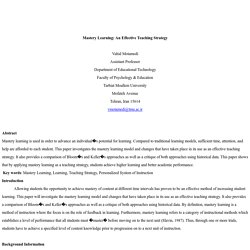
Teaching for Mastery. What Do We Know?
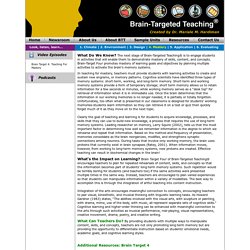
The next stage of Brain-Targeted Teaching® is to engage students in activities that will enable them to demonstrate mastery of skills, content, and concepts. Brain-Target Four promotes mastery of learning goals and objectives by planning multiple activities to activate the brain's memory systems. In teaching for mastery, teachers must provide students with learning activities to create and sustain new engrams, or memory patterns.
Cognitive scientists have identified three types of memory systems: short-term, working, and long-term memory. Short-term and working memory systems provide a form of temporary storage; short term memory allows us to retain information for a few seconds or minutes, while working memory serves as a “desk top” for retrieval of information when it is in immediate use. What's the Impact on Learning? What Can Teachers Do? Additional Resources: Brain Target 4 Article: Music and Dance Drive Academic Achievement. How to Take a Mid-Year Checkup of Student Mastery in Your School Or District. The mid-point in the school year is a great opportunity for school and district leaders to step back and do an evaluation of standards that may not have been mastered by students from the first half of the year.
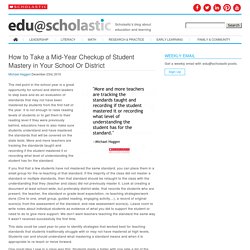
It is not enough to raise reading levels of students or to get them to their reading level if they were previously behind, educators have to also make sure students understand and have mastered the standards that will be covered on the state tests. More and more teachers are tracking the standards taught and recording if the student mastered it or recording what level of understanding the student has for the standard. If you find that a few students have not mastered the same standard, you can place them in a small group for the re-teaching of that standard.
MasteryConnect Reviews. Through MasteryConnect's patent-pending MasteryTracker, teachers can effectively assess core standards, monitor student performance, and report student mastery to parents and administrators.
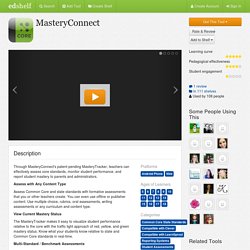
Assess with Any Content Type Assess Common Core and state standards with formative assessments that you or other teachers create. You can even use offline or publisher content. Use mutliple choice, rubrics, oral assessments, writing assessments or any curriculum and content type. View Current Mastery Status The MasteryTracker makes it easy to visualize student performance relative to the core with the traffic light approach of red, yellow, and green mastery status. Multi-Standard / Benchmark Assessments. Why Grades Should Reflect Mastery, Not Speed. Published Online: June 3, 2013 Published in Print: June 5, 2013, as What's in a Grade?
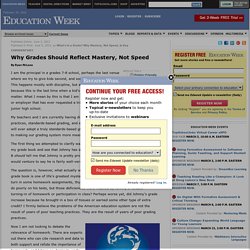
Why Mastery, Not Speed, Is Key Commentary By Ryan McLane I am the principal in a grades 7-8 school, perhaps the last venue where we try to give kids second, and sometimes third, chances. My teachers and I are currently having discussions about grading practices, standards-based grading, and everything in between. The first thing we attempted to clarify was what exactly is a grade? 5 Strategies to Ensure Student Learning. Mesquite Elementary School, in Tucson, Arizona, attributes much of its turnaround in student performance -- and their ongoing success -- to their Reteach and Enrich program.
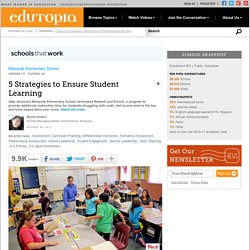
Within the first year of implementation, even before teachers had worked out all the kinks, Mesquite went from a "performing" school (as labeled by the state of Arizona) in 2002 to an "excelling" school, the highest ranking, in 2003. The school has maintained an "excelling" status ever since. The goal of the program is to give students the opportunity to master essential skills and knowledge before they move on to the next level. Here's the approach: Each week has defined curricular objectives. Reteach and Enrich: How to Make Time for Every Student. Calvin Baker: Most of us grew up, classic American education, you know.
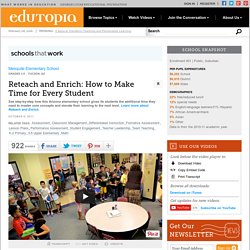
You can go through a unit where these was math, social studies or English, and at the end of the unit, you had a test. Then you moved onto the next unit, because you had to get through all the chapters by the end of the school year. Primary Possibilities: Tracking Mastery & Reteaching. I think over the course of the last few years I have had tuned, retuned, and re-retuned how I track standard mastery in my classroom a million times.
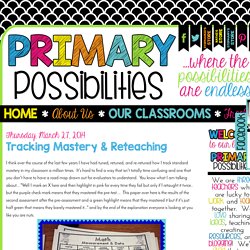
It's hard to find a way that isn't totally time confusing and one that you don't have to have a road map drawn out for evaluators to understand. You know what I am talking about... "Well I mark an X here and then highlight in pink for every time they fail but only if I retaught it twice.. but the purple check mark means that they mastered the pre-test.... This paper over here is the results of the second assessment after the pre-assessment and a green highlight means that they mastered it but if it's just half green that means they barely mastered it... " and by the end of the explanation everyone is looking at you like you are nuts. I came up with these super easy tracking sheets for mastery of the first grade Common Core Math Standards. Mastery Learning Model: Definition, Theory & Approach. In this lesson, we will define the mastery learning model and compare it with traditional teaching.
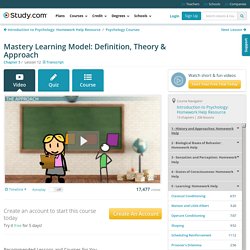
We will also look into the steps through which students master material before moving forward. Explore our library of over 10,000 lessons Click "next lesson" whenever you finish a lesson and quiz. Got It You now have full access to our lessons and courses. You're 25% of the way through this course! Teach for Mastery Learning.